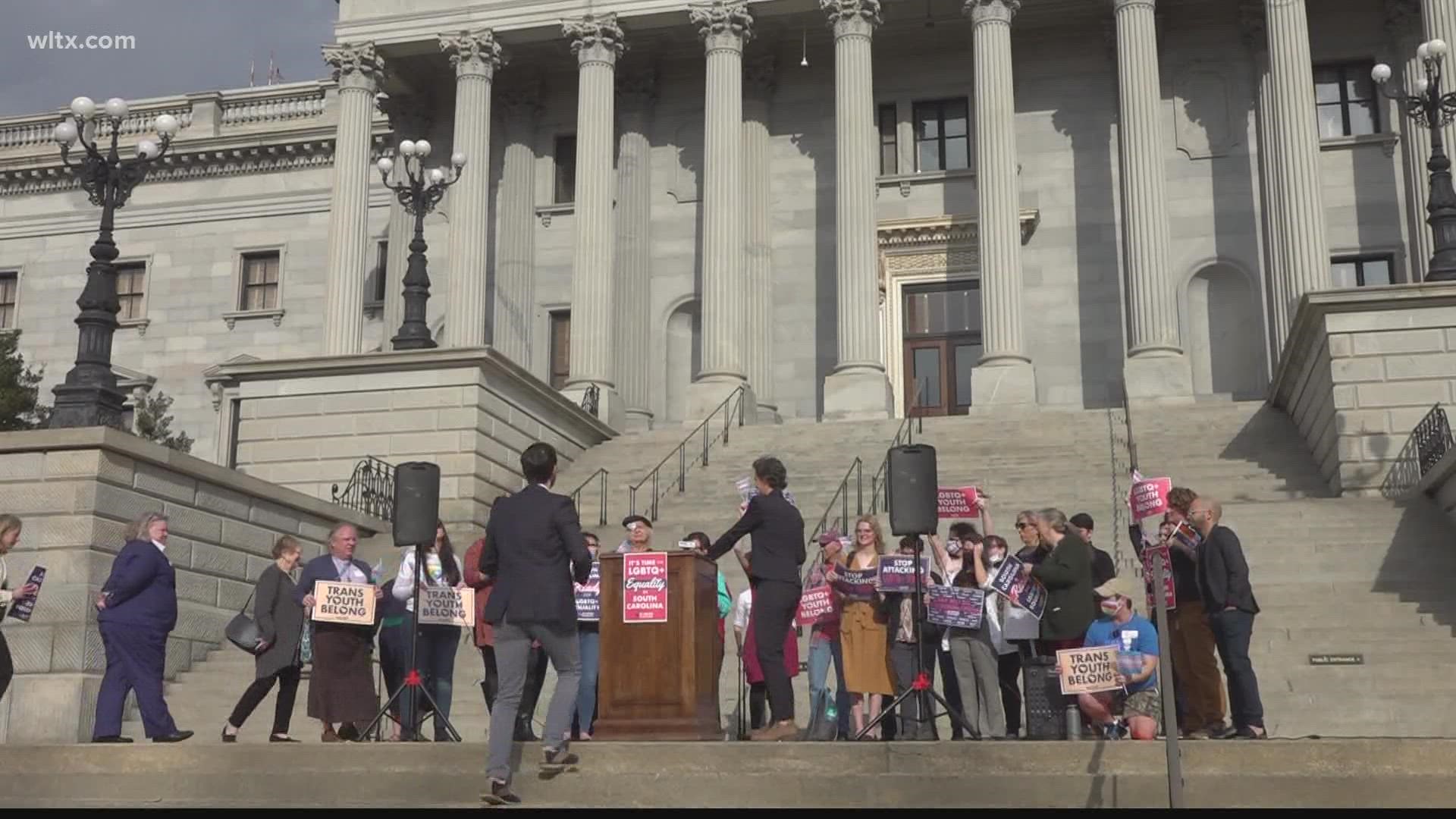COLUMBIA, S.C. — More than a dozen bills targeting the LGBTQ+ community have been filed in South Carolina this year.
Republicans are backing legislation targeting gender-affirming care for children, classroom lessons about sexuality, and drag shows.
The South Carolina United for Justice and Equality Coalition rallied at the State House steps Thursday in response.
"We know that justice and equality will prevail in South Carolina," said Executive Director of the Campaign for Southern Equality (CSE) Reverend Jasmine Beach-Ferrara.
Last year, the GOP passed a law banning transgender student athletes from playing high school sports. They also passed a proviso in the budget banning the Medical University of South Carolina from providing gender-affirming care.
“We know there have been a ton of anti-LGBTQ bills filed, more than we’ve seen since I started in 2005,” said Melissa Moore, the organizing director of the Women’s Rights and Empowerment Network. “It’s one of the highest volumes in the entire country.”
Many of the bills seek to ban gender-affirming health care for trans people 21 years old or under.
This type of care is recommended by major medical associations to treat gender dysphoria, the distress someone can feel when their physical presentation doesn’t align with their gender identity. For youth, this care often means using different pronouns or wearing different clothes — but can include puberty blockers, which are fully reversible.
"It’s kind of frustrating that people aren’t trying to see the humanity of trans people or trans kids," said Cal Copland.
Vice Chairman of the Freedom Caucus, the group behind several of these bills, Rep. RJ May (R-Lexington), argues it's about protecting children and parental rights.
"As a state, we say they can't make a decision on a tattoo, they can't make a decision on alcohol, they can’t make a decision about voting, yet we’re going to allow them to have permanent life-altering surgery," May said.
Last year, The Freedom Caucus' public records request led to the Medical University of South Carolina confirming it no longer provided hormone therapy for transgender children.
Other bills aim to limit classroom instruction about sexuality and gender identity, and some look to restrict drag shows and performers.
"No child should be exposed to sexual shows, whether they are drag queens or adult business, children shouldn’t be allowed in that environment," May said.
Democratic representatives have introduced a new bill that would update the state's nondiscrimination laws to provide protections for LGBTQ people and people of color.
"Everybody has the right to live in a country where they are not hassled and harassed, where they are not judged for who they love," said Rep. Gilda Cobb-Hunter (D-Orangeburg).
Cobb-Hunter acknowledged the bill has slim chances of passing and called on more women and minorities to get involved in politics.
"When you have a House and Senate that is very much clear that they are not going to pass these kinds of bills, you have to change who’s in here.," she said. "My point to people out here who are sympathetic to these issues: get involved in educating people on what this is about."
Newly-elected Rep. Heather Bauer, D-Richland, is sponsoring a bill to make it easier for someone to change their last name.
Many advocates say they will spend the session testifying at committee hearings and contacting their legislators.
"What do you want to do with these people? You just expect them to go away? They’re not going to go away, we are not going to go away," said Gabrielle Mullins.
South Carolina is one of 27 states without any state-level protections from discrimination based on sexual orientation and gender identity.
According to the Williams Institute, 137,000 LGBTQ adults live in South Carolina and an estimated 30,000 LGBTQ youth ages 13-17 live in the state.
- Anti-LGBTQ+ Youth Policy Bills (S.234, H.3197, H.3485)
- Anti-Transgender Healthcare Bills (H3551, S243, S274)
- Bill Granting a Broad ‘License to Discriminate’ Against LGBTQ+ People (H3611)
- Bills to Interfere with the Identity Documents of Transgender People (S364, S276)
- Curriculum Censorship Bills (S246, H3284, H3304, H3464, H3466)
- Attempts to Interfere with the Freedom to Marry (S332)
- Bills to Punish LGBTQ+ Supportive Businesses (H3616, H3564, H3565)
- Bills to Ban Abortion Care in South Carolina (S366, H3552, H3490, S240)

